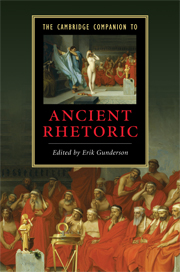Book contents
- Frontmatter
- Introduction
- Part 1 An archaeology of rhetoric
- 1 Fighting words: Status, stature, and verbal contest in archaic poetry
- 2 The philosophy of rhetoric and the rhetoric of philosophy
- 3 Codifications of rhetoric
- Part II The field of language
- Part III The practice of rhetoric
- Part IV Epilogoues
- Appendix 1: Rhetorical terms
- Appendix 2: Authors and prominent individuals
- References
- Index of passages
- Index of subjects
- Series list
2 - The philosophy of rhetoric and the rhetoric of philosophy
from Part 1 - An archaeology of rhetoric
Published online by Cambridge University Press: 28 January 2010
- Frontmatter
- Introduction
- Part 1 An archaeology of rhetoric
- 1 Fighting words: Status, stature, and verbal contest in archaic poetry
- 2 The philosophy of rhetoric and the rhetoric of philosophy
- 3 Codifications of rhetoric
- Part II The field of language
- Part III The practice of rhetoric
- Part IV Epilogoues
- Appendix 1: Rhetorical terms
- Appendix 2: Authors and prominent individuals
- References
- Index of passages
- Index of subjects
- Series list
Summary
We are the speaking animals. To take a leaf from Aristotle’s book, the permanently mute or unremittingly taciturn are inferior beasts or superior gods; to be a person is to be gregarious, and to associate in the human fashion is to speak among ourselves. Indeed, creation and discovery of the individual self are conditional on locating this self among other selves; but since these others are nodes in a linguistic network, a society of speakers, acquisition of a language and entry into a community necessarily proceed intandem.
This skeletal delineation of linguistic essentialism will strike some as at best tendentious, at worst grotesquely unscientific, bereft of empirical foundations. No matter: for overwhelmingly many others, the absolute centrality of language is a truism so conspicuous as barely to deserve acknowledgment, before one passes on to the burgeoning questions to which it immediately gives rise: is all thought linguistic? Do the expressive resources of all languages come to the same sum, or do different languages manifest characteristic (dis)advantages? With such linguistic relativism, we are moving from what appears to be strictly theoretical to issues with ethical import; consideration of the possibility that language might encode, enshrine, confirm, or even partially comprise various sociopolitical asymmetries takes us further along the spectrum. Participants in such debates may hotly disagree, while fundamentally agreeing that language is always, inevitably at the core of their dispute. Profound insight, or profound delusion: if the latter, this chapter is a modest foray into the pathology of our exaggerated logocentric proclivities.
- Type
- Chapter
- Information
- The Cambridge Companion to Ancient Rhetoric , pp. 43 - 58Publisher: Cambridge University PressPrint publication year: 2009
- 2
- Cited by

